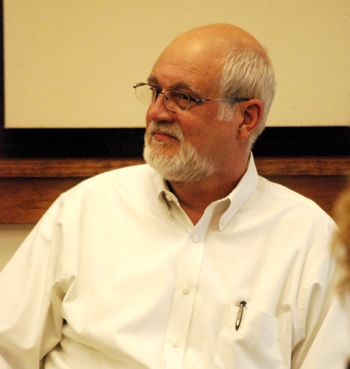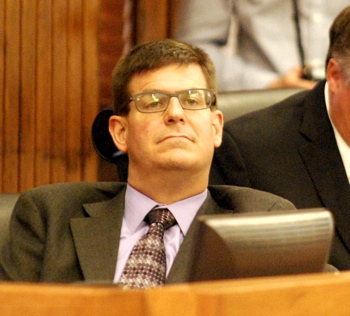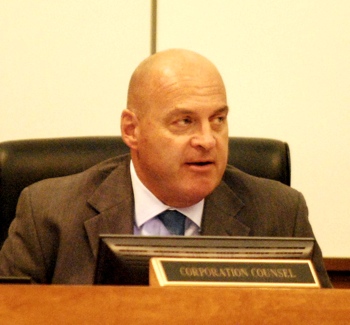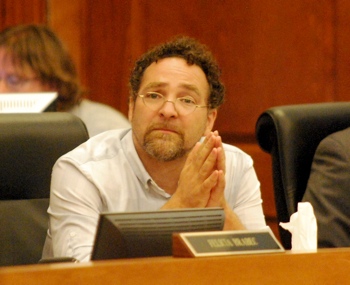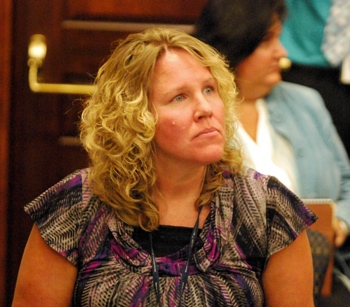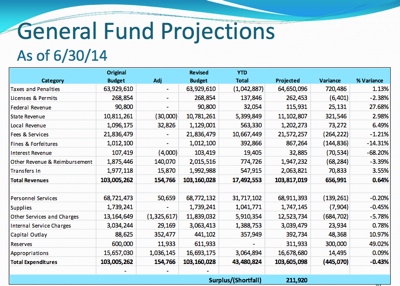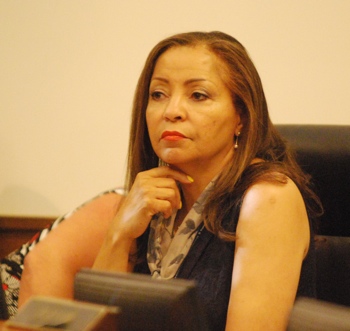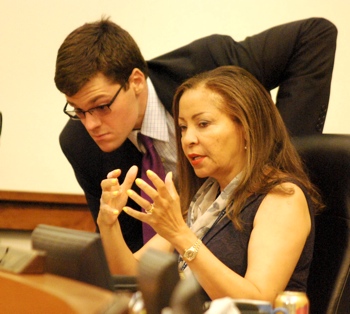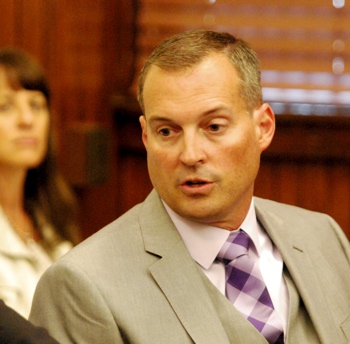County Takes Action on Budget, Tax Levies
Washtenaw County board of commissioners meeting (Aug. 6, 2014): County commissioners took initial votes to levy two taxes that would generate revenues for economic development, agricultural projects, and support of indigent veterans.
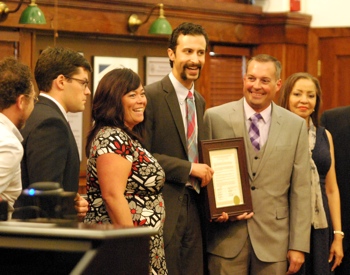
Chris Haslinger (second from right), director of training for the United Association (UA) of plumbers and pipefitters, received a proclamation from the county board of commissioners at the board’s Aug. 6 meeting. They were gathering for a photo to mark the event. From left: Conan Smith, Andy LaBarre, Alicia Ping, Yousef Rabhi, Chris Haslinger, and Verna McDaniel, the county administrator. (Photos by the writer.)
The county has determined that it’s authorized to collect up to 1/10th of a mill for support of indigent veterans, without seeking voter approval. That’s because the state legislation that enables the county to levy this type of tax – the Veterans Relief Fund Act, Public Act 214 of 1899 – predates the state’s Headlee Amendment. The county first began levying this millage in 2008, and collects the tax in December. The current proposal is to levy 1/27th of a mill in December 2014, which is expected to raise about $540,887 in revenues for use in 2015.
The county’s position is that Act 88 can also be levied without voter approval to fund economic development and agricultural activities. This year, the proposal is to levy 0.07 mills in December 2014 – the same rate that was levied in 2013. It’s expected to raise an estimated $1,022,276 in property tax revenues.
Final action on these tax levies is expected at the board’s Sept. 3 meeting.
Also related to Act 88, the board approved allocations of $87,760 in Act 88 revenues that were collected in 2013, to support six projects. Four of the projects are administrated by Ypsilanti-based Growing Hope, with the remaining two projects initiated by the Michigan State University Product Center.
During the Aug. 6 meeting, commissioners approved amendments to both the Act 88 projects resolution and the resolution to levy the tax this year. The amendments directed the county’s corporation counsel to provide a written opinion about how Act 88 revenues can lawfully be used, and how the tax can be lawfully levied without a vote of the people. The amendments were brought forward by Dan Smith (R-District 2).
In other action, the board received a second-quarter budget update, with projections showing a general fund surplus of $211,920 for the year. The board also made mid-year budget adjustments, which included allocating a $3.9 million surplus from 2013 into unearmarked reserves.
Commissioners approved a new policy to guide decisions on tax increment finance (TIF) proposals, and supported revised rules and guidelines from the water resources commissioner. Those revisions relate to procedures and design criteria for stormwater management systems.
A proclamation made during the Aug. 6 meeting honored Herb Ellis Sr., the first black man to be elected to the Washtenaw County board of commissioners. Ellis was elected in 1968 and served until 1982, representing Ann Arbor. During that time he also was the first black chair of the county board. He passed away on July 10, 2014 at the age of 98.
Another resolution recognized the contributions of United Association (UA), a union of plumbers, pipefitters, sprinkler fitters, welders, and heating, ventilation, air conditioning and refrigeration (HVACR) technicians. They’re in this area from Aug. 9-15 for their 61st annual training program, and have announced a new 15-year agreement to continue the program at the Washtenaw Community College.
The Aug. 6 meeting was held one day after the Aug. 5 primary elections. At the start of the meeting, board chair Yousef Rabhi congratulated all primary candidates, and said he looked forward to working with Ruth Ann Jamnick, the winner of the District 5 Democratic primary. He quickly added “pending the general election, but I think…” – a comment that drew laughs. District 5 – which covers August Township and parts of Ypsilanti Township – is heavily Democratic. Jamnick, who prevailed in the four-way Democratic primary, will face Republican Timothy King in the Nov. 4 general election. District 5 was the only race that was contested for the county board, with incumbent Rolland Sizemore Jr. not seeking re-election. Incumbents in all other districts of the nine-member board were unchallenged in the primary.
At the end of the meeting, the board voted to enter into a closed executive session for the purpose of reviewing attorney-client privileged communication. It is one of the exemptions allowed under the Michigan Open Meetings Act.
After about 30 minutes, three commissioners returned to the boardroom – Dan Smith (R-District 2), Alicia Ping (R-District 3) and Conan Smith (D-District 9). They indicated to The Chronicle that they thought the discussion in the closed session had strayed away from the limits imposed by the OMA, and they had left the session because of that. They did not state what the nature of the discussion had been, nor the topic of the session.
Soon after, the remainder of the board emerged from the closed session, and the meeting was adjourned.
Act 88 Grants, Levy
The Aug. 6 agenda included a resolution to approve allocations to six projects, using funds from an Act 88 millage that the county levies each year. Commissioners were also asked to give initial approval to levy that tax.
The county’s position is that Act 88 of 1913 can be levied without voter approval to fund economic development and agricultural activities. This year, the proposal is to levy 0.07 mills in December 2014 – the same rate that was levied in 2013. It’s expected to raise an estimated $1,022,276 in property tax revenues.
In previous years, the resolution setting this millage has outlined how the revenues would be allocated. The largest allocations have gone to the county’s office of community & economic development, and to the nonprofit Ann Arbor SPARK.
However, at its Nov. 6, 2013 meeting, the board adopted a new policy for allocating Act 88 revenues, drafted by Conan Smith (D-District 9). [.pdf of Act 88 policy] The policy included creating an Act 88 advisory committee to make recommendations to the board and prepare an annual report that assesses how Act 88 expenditures have contributed toward progress of goals adopted by the board. The policy allows the committee to distribute up to 10% of annual Act 88 revenues without seeking board approval. The policy also allocates up to 30% of revenues to the county office of community & economic development, which administers Act 88 funding.
This year, the 10% amounts to $91,753. Of that, $3,993 remains unallocated and will stay in the Act 88 fund balance to support future projects. Beyond that, a total of $87,760 in funding was recommended for six projects initiated by two organizations – the Michigan State University Product Center, and Ypsilanti-based Growing Hope [.pdf of staff memo]:
- $10,060 to the MSU Product Center to study the potential for enhanced food processing in Washtenaw County.
- $12,700 to the MSU Product Center to develop “MarketMaker,” a food industry business network and database.
- $20,000 to Growing Hope/Reconsider to run community education events on the Michigan Invests Locally Exemption Act and to study the potential and processes for investing locally in Washtenaw County.
- $13,000 to Growing Hope/Revalue to provide two full-day educational events to assist investors in incorporating local investment offerings into their financial plans.
- $13,000 to Growing Hope to create a study on increasing food assistance sales at farmers markets in Washtenaw County.
- $19,000 to Growing Hope to support the development of an Ypsilanti “MarketPlace,” a year-round farmer’s market, and “MarketHub,” a food distribution center serving underserved communities.
These recommendations were made to the county board by the Act 88 advisory committee. Members are: County commissioners Ronnie Peterson (D-District 6), Alicia Ping (R-District 3) and Conan Smith (D-District 9); Todd Clark, president of United Bank & Trust; and Art Serafinski, chair of the Ypsilanti Convention & Visitors Bureau board. Staff support was provided by the county’s office of community & economic development (OCED), including economic development officer Tony VanDerworp, who attended the Aug. 6 meeting along with OCED director Mary Jo Callan.
Act 88 Grants: Board Discussion
Commissioner Dan Smith (R-District 2) began the discussion by noting that he’s had some long-standing concerns about the legality of how the county is using Act 88 funds. Rather than sorting those issues out that night, he said he’d rather work with the county’s corporation counsel and come to an understanding about it.
He then brought forward an amendment for the projects resolution, requesting that corporation counsel provide the board with a written opinion about the lawful use of the sums raised under Act 88. Smith’s original proposed amendment stated:
FURTHERMORE BE IT RESOLVED that the Washtenaw County Board of Commissioners directs Corporation Counsel to provide an exhaustive written opinion, by December 31, 2014, detailing the lawful uses of sums raised under Act 88 of 1913 (MCLA 46.161), and that this opinion address in similar manner other possible interpretations.
Smith’s motion did not receive support from any other commissioners to bring it forward for discussion, so Alicia Ping (R-District 3) declared it dead due to the lack of support.
Conan Smith (D-District 9) and Yousef Rabhi (D-District 8) had been out of the room during this part of the meeting, and returned to their seats just after the motion had been declared dead. Conan Smith said he’d be willing to support Dan Smith’s motion. Alicia Ping (R-District 3) – vice chair of the ways & means committee, who was chairing the meeting in the absence of Ways & Means chair Felicia Brabec (D-District 4) – allowed D. Smith to reintroduce the motion. It was then supported by C. Smith.
C. Smith said there’s been a lot of confusion about Act 88, “and we face it every year.” He and D. Smith had spent a lot of time on the phone talking about the meaning of the act, he said, so “it would be really helpful to have an interpretation that we can use as we go into our granting processes and the distribution of these funds.”
At the Act 88 committee meeting that was held earlier in the day, C. Smith said, they began talking about the grants process for next year, and about how to ensure that the allocations relate specifically to the purposes of the act – “just to make sure we’re on the straight and narrow.” One way to go about it is to leave it up to the committee to determine, though none of the committee members are lawyers, he noted. He thought it would be great to have a statement to rely on. Even if it’s not possible to be definitive – because the law itself is unclear – it would be useful to know what ways the law could be interpreted, he said. C. Smith concluded that he was comfortable with the amendment.
Andy LaBarre (D-District 7) asked Curtis Hedger, the county’s corporation counsel, about what legal effect Hedger’s legal opinion would have – “what would it get us on the hook for down the road, good or bad?”
Hedger replied that like any opinion, it would simply be his advice to the board. As policymakers, ultimately it’s the county commissioners who decide what to do, he noted. If the amendment were approved, he’d give them his best interpretation of how the Act 88 revenues can be spent. Hedger said that asking him to come up with alternative interpretations, as directed by D. Smith’s draft amendment, was a little “touchy-feely.” He added: “That would just be me speculating.”
As far as putting the county on the hook one way or another, Hedger said he didn’t think that was an issue, because it would just be an opinion.
Yousef Rabhi (D-District 8) asked what D. Smith meant by the word “exhaustive.” D. Smith replied that Hedger has already provided the board with opinions on other topics that explain how phrases could be construed in different ways. That’s what D. Smith intended by “exhaustive.” The language in MCLA 46.161 is extremely convoluted, he added, so Hedger could explain how parsing the grammar in different ways would yield different interpretations. Then it’s up to the board to decide which interpretation to use, he said.
Rabhi said he thought an opinion was simply an opinion – not a description of other opinions. He wasn’t sure it was an appropriate approach to ask for alternative interpretations. Rabhi would support asking Hedger to give the board his interpretation of the law, but it wasn’t Hedger’s job to do more than that.
C. Smith said he’d asked D. Smith to include that language in the amendment. He noted that the very first sentence of Act 88 has a semicolon in it. That sentence states:
The boards of supervisors of the several counties may levy a special tax on the taxable property within their respective counties for the purpose of creating a fund; or appropriate out of the general fund an amount to be used for advertising agricultural or industrial advantages of the state or county or any part of the state, or for collecting, preparing or maintaining an exhibition of the products and industries of the county at any domestic or foreign exposition, for the purpose of encouraging immigration and increasing the trade in the products of Michigan, or advertising the state and any portion thereof for tourists and resorters.
As an English major, C. Smith said, his interpretation of a semicolon is to stop one thought, and append another thought to it – interrelated but separate. So for the Act 88 language, he said, there might be two legitimate interpretations of the function of that semicolon. It’s important for the board, which will be allocating the Act 88 dollars, “to have some degree of comfort that we’re doing it within the parameters of legality, even if those aren’t 100% clear,” he said.
The courts ultimately are responsible for interpreting the law, C. Smith said. If the board asked for a legal opinion and someone then sued the county over Act 88, the board would have a document that showed the legal underpinnings for their decision – and “I would feel more comfortable with the decisions that we are making.”
Act 88 is a mess, C. Smith continued – it’s “ancient” legislation that’s been amended over the decades, making it even more convoluted. “Just knowing that we’re walking down a path that is legal – even if we’re not sure that that is the absolute right path – I think would be helpful for us on the committee to make an allocation of the funds,” he said. “What I definitely don’t want to do is to walk down a path that’s not legal.”
D. Smith said he wants to make sure there’s a very full discussion of the law’s various nuances. At the end of the day, Hedger will provide his best interpretation of the law, he added. But as part of that guidance, it’s prudent to explore other ways that it could be interpreted. It should answer as many questions as can be answered, he said, “so that this issue is put to rest once and for all.”
Rabhi said it seemed like D. Smith was trying to do Hedger’s job. He thought they should ask the person that they hired to be the county’s attorney for his opinion. If the board wants a white paper on Act 88, they should ask for that – but maybe not from Hedger, he said. Rabhi asked Hedger what he thought.
Hedger replied that after this discussion, he had a better feel for what the amendment is asking for. He said D. Smith was right – when Hedger writes legal opinions for the board, he often describes other interpretations that he doesn’t necessarily agree with. He didn’t have a problem with this approach.
Alicia Ping (R-District 3) didn’t think the amendment accurately reflected what the board wanted from Hedger. C. Smith said he’d be comfortable striking the last clause: “…and that this opinion address in similar manner other possible interpretations.” D. Smith agreed to that change.
Rabhi thanked the Smiths, saying that striking the clause would allow him to support the amendment.
The revised amendment was as follows: [strike-through reflects a clause that was struck during deliberations]:
FURTHERMORE BE IT RESOLVED that the Washtenaw County Board of Commissioners directs Corporation Counsel to provide an exhaustive written opinion, by December 31, 2014, detailing the lawful uses of sums raised under Act 88 of 1913 (MCLA 46.161), and that this opinion address in similar manner other possible interpretations.
Outcome on the amendment, as revised: It passed unanimously on a voice vote.
Outcome on main resolution, as amended: The board unanimously passed the resolution allocating Act 88 funds, without additional discussion.
After the vote, Conan Smith commented that this was the first round of competitive Act 88 grants, and the projects are really interesting. “I think they’ll be very impactful on the community,” he said. He was especially excited about the grant to Growing Hope to study how to increase the use of food stamps at the Ypsilanti farmers market, so that people who use food stamps can get better access to fresh fruit and vegetables. He encouraged everyone in the community to take a close look at these projects.
Rolland Sizemore Jr. (D-District 5) expressed some frustration about the amount of money in general that’s being spent on studies, rather than directly on projects. He thought that the Ypsilanti farmers market project should be expanded to other parts of the county.
Act 88 Levy: Board Discussion
Later in the meeting, the board was asked to consider a separate resolution that would authorize the county to levy the Act 88 tax this year.
Dan Smith brought forward a similar amendment, aimed at getting a firm understanding of the Act 88 millage:
FURTHERMORE BE IT RESOLVED that the Washtenaw County Board of Commissioners directs Corporation Counsel to provide an exhaustive written opinion, by October 1, 2014, detailing the exact mechanism under which Act 88 of 1913 taxes may be levied in excess of Article IX, Section 6 constitutional limits without a vote of the people.
There was no discussion on the amendment.
Outcome on the amendment: It passed unanimously on a voice vote.
Outcome on the main resolution, as amended: It passed unanimously.
2nd Quarter Budget Update
The administration gave an update on the county’s second-quarter financial status, for the period from Jan. 1 through June 30, 2014. County administrator Verna McDaniel introduced the update by calling it “good news.” [.pdf of presentation]
Tina Gavalier of the county’s finance staff told commissioners that property tax revenue is showing a projected surplus of $720,000 compared to what was budgeted for 2014. In addition, the sheriff’s office is projecting a roughly $200,000 surplus due to federal, state and local reimbursements for prisoner boardings. In the category of general intergovernmental revenues, there’s now a projected surplus of $370,000 due to state liquor tax funds and local reimbursements for animal control.
Several other areas are showing a revenue shortfall, however, compared to the amount budgeted. Those units include the clerk/register of deeds ($350,000 shortfall), district court ($209,000 shortfall), trial court ($73,000 shortfall) and interest income ($71,000 shortfall).
Gavalier noted that the trial court is still determining the impact of a Michigan Supreme Court decision prohibiting the assessment of court costs on criminal cases. The court can collect on anything that was assessed prior to the court ruling, she explained, but if no legislative action is taken, courts could see a substantial decrease in future revenues.
Overall, the net projected revenues for the general fund show a revenue surplus of $656,991.
On the expenditure side, the sheriff’s office has a projected over-expenditure of $673,000 related to overtime costs, inmate food and medical services, and law enforcement operating supplies. Gavalier said the sheriff and his staff are actively working to reduce that over-expenditure by year’s end. All other departments are reporting a combined operating surplus of $135,000.
In other expenditure categories, the line item for tax appeals and refunds is projected to have a surplus of about $239,000. The line item of central charges has a projected surplus of $93,000 due to tax refund overpayments being less than budgeted – partially offset by projected over-expenditures from the homelessness initiative that the board approved earlier this year. Appropriations are assumed to be on budget at $16.2 million. The expenditure projections also took into account structural and non-structural budget adjustments that have been made so far in 2014, totaling $560,000.
The net projected over-expenditures for the general fund are $445,070. So the projected general fund surplus for 2014 is $211,920.
If that $211,920 is added to the fund balance at year’s end, Gavalier said, then the fund balance would be 20.3% of the general fund expenditures.
Most departments that aren’t part of the general fund are on budget or are projecting a surplus, Gavalier reported. Two areas – veterans relief and risk management – are using their fund balances as planned, she said.
Some revenue issues to monitor include: (1) state legislation that might repeal or reform Act 88, (2) revenues for the clerk/register of deeds office, (3) court revenues, (4) personal property tax reform, and (5) payments from state revenue-sharing. Expenditure items to monitor include rising costs in the child care fund due to increased caseloads and placements, the sheriff’s office costs, and union contract negotiations.
Gavalier noted that the board will receive a third-quarter update in November, with a budget reaffirmation process taking place this fall for the 2015-2017 budget.
2nd Quarter Budget Update: Board Discussion
Responding to a query from Yousef Rabhi (D-District 8), Tina Gavalier explained that the projected revenue shortfall of $350,000 in the clerk/register of deeds office was from lower-than-projected fees from document-processing – such as real estate transfers and marriage licenses. It’s lower than it’s been in the past several years. Rabhi quipped: “Buy houses and get married, everybody!”
Regarding the courts, Rabhi asked if there’s legislation pending to address the impact of the recent state Supreme Court ruling. He wondered if the county’s lobbyist needed to work on something in Lansing. [Washtenaw County and several other local municipalities pay Governmental Consultant Services Inc. to act as a lobbyist for their interests at the state level.]
County administrator Verna McDaniel said she hadn’t taken any action on this issue, but would be talking with the court administrators about it. She pointed out that the courts operate under a lump sum budget.
Rabhi said it might be worthwhile to see what other counties are facing, and to see if there’s potential to work across county lines. McDaniel said she’d get more information about that.
Dan Smith (R-District 2) wondered when the new GASB regulations take effect. He was concerned when the administration talks about a “surplus,” knowing that the county actually has about a huge amount of unfunded liability.
By way of background, Smith was referring to more than $200 million in unfunded liabilities from the retiree health care and pension funds. The new accounting changes – required by the Governmental Accounting Standards Board (GASB) – take effect in phases. In 2014, the main change will be more disclosures in notes to the financial statements, required by GASB 67. But in 2015, when GASB 68 is implemented, the county’s unfunded actuarial accrued pension liability will be booked as a liability in the county’s statement of net position, which will be a significant change, according to the county’s finance staff. New standards for health care liabilities will be addressed in the future by GASB, and the county’s accounting staff is working on that.
McDaniel replied that it’s an issue that staff will “continue to dialogue with this board about,” to get direction in terms of priorities and any additional actuarial payments that might be required.
Alicia Ping (R-District 3) asked about the shortfall for the courts, saying she was concerned about it. She wondered how that will impact the memorandum of understanding with the county, regarding the lump sum budget under which the courts operate. McDaniel noted that in the past, the courts have been able to work within their lump sum budget. But this year, the impact of the Supreme Court ruling will be substantial, she said. So the courts will have to come up with a plan about how they’ll handle it. The impact could be as much as a half million dollars, McDaniel said. “We’ll work with them, and we’ll have more information as this develops.”
Ping also asked for a breakdown in line-item costs that are contributing to the over-expenditures in the sheriff’s office budget. McDaniel said that the sheriff, Jerry Clayton, felt confident that expenses will even out over the remainder of 2014, based on actions that his office is taking.
Outcome: This was not a voting item.
2014 Budget Adjustments
Commissioners were asked to give final approval to mid-year budget adjustments, including allocating this year’s higher-than-expected property tax revenues and a $3.9 million surplus from 2013. Initial approval had been given at the board’s July 9 meeting.
The adjustments increased the general fund budget’s expenses and revenues by $720,486 for 2014, $733,233 for 2015, $745,980 for 2016 and $758,727 for 2017. The county operates on a four-year budget, with the fiscal year matching the calendar year.
The adjustments were recommended by county administrator Verna McDaniel, who requested setting aside the $3,920,818 surplus from 2013 in unearmarked reserves, rather than spending it. The projected year-end 2014 fund balance is $20,638,675. The county board had previously approved a goal of holding a fund balance equal to 20% of its general fund budget. For 2014, the general fund budget is $103,127,202. [.pdf of staff memo and mid-year budget resolution]
In addition, the following mid-year budget adjustments were made to the general fund:
- Structural adjustments resulting in a $494,677 increase in expenditures for: (1) providing employee health care coverage for autism; (2) a consultant to help with the board’s budget priority work, (3) a “local government initiatives” intern; (4) reinstatement of two full-time equivalent positions in the sheriff’s office; and (5) salary adjustments for non-union employees.
- Non-structural, one-time, adjustments that increased expenditures by $65,000 for homelessness initiatives.
The administration recommended that the remaining $160,809 be held as an undesignated allocation until budget projections improve as new information becomes available. Finance staff gave a second-quarter budget update on Aug. 6, projecting that the county will have a $211,920 general fund surplus at the end of 2014. [.pdf of budget presentation]
When an initial vote was taken on July 9, commissioners Dan Smith (R-District 2) and Conan Smith (D-District 9) had voted against it. On Aug. 6, both raised the same concerns they’ve voiced earlier.
Conan Smith said he hoped that when the county achieves its goal of a fund balance equal to 20% of the general fund budget, then any extra surplus would be “put to work in the community.” With its vote that night, the board will have achieved fiscal stability, he said, and he looked forward to achieving community stability as well.
Dan Smith stressed the importance of setting a budget and sticking to it, with adjustments coming only during the annual budget affirmation process – rather than throughout the year. There are other things to focus on, he said, including policy issues.
Yousef Rabhi (D-District 8) said he agreed with C. Smith. The board has done a lot to make sure the county’s financial security is in place. Looking forward, there are some investments that the county can make in the community. He thanked C. Smith for advocating on that issue.
Outcome: The budget adjustments passed unanimously.
Veterans Relief Tax
Commissioners were asked to give initial approval to levy a tax to support services for indigent veterans.
The county has determined that it is authorized to collect up to 1/10th of a mill without seeking voter approval. That’s because the state legislation that enables the county to levy this type of tax – the Veterans Relief Fund Act, Public Act 214 of 1899 – predates the state’s Headlee Amendment. The county first began levying this millage in 2008, and collects the tax in December. Services are administered through the county’s department of veterans affairs.
Since 2008, the county board has slightly increased the rate that it levies each year. In 2012, the rate was 0.0286 mills – or 1/35th of a mill. It was raised to a rate of 1/30th of a mill in December 2013, to fund services in 2014.
The current proposal is to levy 1/27th of a mill in December 2014, which is expected to raise about $540,887 in revenues for use in 2015.
There was no discussion of this item at the board’s Aug. 6 meeting.
Outcome: The board unanimously gave initial approval to levy this millage. A final vote is expected at the board’s Sept. 3 meeting.
New TIF Policy
Commissioners were asked to give initial approval a policy to guide the county’s participation in tax increment financing (TIF) authorities.
At its Oct. 16, 2013 meeting, the board had passed a resolution directing county administrator Verna McDaniel to develop a policy for evaluating future TIF proposals. The resolution stated that the policy would be developed with input from staff of the office of community and economic development, the equalization department, and the brownfield redevelopment authority. The Oct. 16 resolution was passed over dissent by the board’s two Republican commissioners, Dan Smith (R-District 2) and Alicia Ping (R-District 3).
Subsequently, an advisory committee was formed to help develop the policy. Members were: county commissioner Andy LaBarre (D-District 7); county treasurer Catherine McClary; corporation counsel Curtis Hedger; and finance director Kelly Belknap.
The two-page policy brought forward by McDaniel lays out a process by which the board would consider any proposed or amended Corridor Improvement Authority (CIA) or Downtown Development Authority (DDA) where the capture of county tax revenues is requested. [.pdf of TIF policy]
New TIF Policy: Board Discussion
Dan Smith (R-District 2) referred to this section of the policy:
III. Tax Increment Financing Participation Process
Any local unit of government proposing a new or amended Corridor Improvement Authority or Downtown Development Authority, or other statutory entity empowered to capture, incremental County tax revenues are requested, shall adhere to the following review process, in addition to those specified by the appropriate state enabling legislation:
…
D. Any County participation in these Tax Increment Financing Districts shall be through the execution of a participation agreement. A participation agreement shall include, at a minimum, extent of County participation including estimated amount (consideration of dollar for dollar and percentage estimates), duration, and methods, if any, of termination and reporting requirements.
IV. County Opt Out Authorization
In the event a requesting entity fails to adhere to this process, the Washtenaw County Board of Commissioners authorize the County Administrator to take the appropriate steps to opt out of participation in the proposed tax increment financing plan.
It appeared to D. Smith that no additional board approval would be required, in order for the county administrator to begin opt-out proceedings if the requesting entity doesn’t follow the agreed-upon process. He didn’t object to that approach, but wanted to make certain that it’s what is intended.
Andy LaBarre (D-District 7) responded, saying that D. Smith’s interpretation was correct. Corporation counsel Curtis Hedger said the committee gave that authorization because of a potential timing issue. There are times when deadlines related to the TIF process would occur before the next board meeting, “so it gives the administrator some flexibility,” he said.
LaBarre said the policy is an attempt to give the board as broad a framework as possible. This is a tool the board could use, he said, but he also urged the board to look at each individual proposal in its set-up and its context. There are so many different types of tax-capture mechanisms for many different purposes, so he wanted to give that caveat. LaBarre praised the county staff for their work in developing this policy, saying “I simply went along for the ride.
Outcome: The TIF policy passed unanimously on an initial vote. A final vote is expected at the board’s next meeting, on Sept. 3.
Appointments
Yousef Rabhi (D-District 8), the board’s chair, made several nominations for appointments.
- Food Policy Council: Khadije Wallace to the slot for a citizen representative, for a term ending Dec. 31, 2014.
- River Raisin Watershed Council: Evan Pratt, the county’s water resources commissioner, as the Washtenaw County representative; and Harry Sheehan, environmental manager with the water resources commissioner’s office, as the county alternate. Those terms both end on Dec. 31, 2014.
- 2014 Remonumentation and Land Survey Peer Review Group: Thomas Sutherland, John Jekabson, Kevin Gingras, Patrick Hastings and Kenneth Coleman.
Outcome: All appointments were confirmed.
Water Resources: Revised Rules & Guidelines
The board’s Aug. 6 agenda included an item to support new rules and guidelines proposed by the county’s water resources commissioner, Evan Pratt. The changes relate to procedures and design criteria for stormwater management systems. [.pdf of revised rules and guidelines]
The previous rules and guidelines had been adopted in 2000. According to a staff memo, the new changes reflect updated requirements of the county’s National Pollutant Discharge Elimination System (NPDES) Phase II stormwater discharge permit, which is administered by the Michigan Department of Environmental Quality.
Pratt attended the Aug. 6 meeting, but there were no questions from commissioners and no discussion on this item.
Outcome: The resolution supporting the revised rules and guidelines was approved.
Communications & Commentary
During the Aug. 6 meeting there were multiple opportunities for communications from the administration and commissioners, as well as public commentary. In addition to issues reported earlier in this article, here are some other highlights.
Communications & Commentary: Proclamations – UA
At its July 9, 2014 meeting, the board had passed a proclamation welcoming the United Association (UA), a union of plumbers, pipefitters, sprinkler fitters, welders, and heating, ventilation, air conditioning and refrigeration (HVACR) technicians. They’ll be in this area from Aug. 9-15 for their 61st annual training program. For the past 25 years, that program has been held in Washtenaw County on the Washtenaw Community College campus, bringing about 2,400 participants to the county with an estimated economic impact of $5 million. [.pdf of UA proclamation]
At the Aug. 6 meeting, Chris Haslinger, director of training for the UA, was on hand to receive the proclamation. He thanked the board. He described the growth of the training program over the years, pointing out that this year there will be 450 first-time attendees. He noted that the community here welcomes the UA members, and that the union receives a great deal of assistance from the Ann Arbor and Ypsilanti convention and visitors bureaus. Both presidents of those bureaus – Mary Kerr and Debbie Locke Daniel – also attended the county board’s Aug. 6 meeting.
Halsinger reported that the UA had reached an agreement with WCC to extend the program here through 2028. There are eight people based in the Ann Arbor area who work year-round on UA training programs, he said. Eight people might not seem like a lot, he added, but it’s important that they live here and contribute to the community.
He described some other initiatives undertaken with WCC, and concluded by thanking the county, the city of Ann Arbor, Local 190 and Local 704. “We look forward to a future in the Ann Arbor community,” he said.
Board chair Yousef Rabhi (D-District 8) responded by thanking Halsinger and sharing an anecdote. He said he was on a conference call with U.S. vice president Joe Biden, discussing the future of the country’s talent and job resources. Rabhi said he asked Biden a question and mentioned the partnership between WCC, the county, the UA and other communities as an example of the direction that the country should be heading. He thanked Haslinger for UA’s investment in this community.
Communications & Commentary: Proclamations – Herb Ellis Sr.
Yousef Rabhi (D-District 8) read a proclamation honoring Herb Ellis Sr., the first black man to be elected to the Washtenaw County board of commissioners. Ellis was elected in 1968 and served until 1982, representing Ann Arbor. During that time he also was the first black chair of the county board. [.pdf of proclamation]
Ellis had passed away on July 10, 2014 at the age of 98.
Jeff Ellis, one of Ellis’ sons, was on hand to accept the proclamation. His father’s life was dedicated to serving others, either through education, civic organizations or as an elected official, he said. In particular, Ellis had been interested in public health issues, promoting educational opportunities for young people, and improving the lives of senior citizens.
Herb Ellis was a pioneer in the community, as one of the first black teachers in the Ann Arbor public school system, and the first person of color to be elected to the county board of commissioners. He was recognized as a consensus-builder, Jeff Ellis said. “He believed in leading by example, and did his best to be a positive role model in all aspects of his life. By most accounts, he was successful in that effort.”
Communications & Commentary: Proclamations – Donald Shelton
The board had a third proclamation – for 22nd circuit court judge Donald Shelton, who is retiring this year. [.pdf of proclamation for Shelton] Shelton was out of town and did not attend the Aug. 6 meeting. Yousef Rabhi reported that the proclamation would be given to Shelton at a retirement party later this year.
Communications & Commentary: Public Commentary
Thomas Partridge introduced himself as a recent candidate for political office in the state legislature and Ann Arbor city council. He called on the county to redouble its efforts after the Aug. 5 primary election to give priority to eliminating homelessness, generating adequate affordable housing, true countywide affordable and accessible public transportation, affordable health care and education. He supported Act 88 funding but didn’t think the grants reflected these priorities. Partridge advocated for support of Democrat Mark Schauer in his bid for governor, and for a progressive Democratic platform to address the needs of the most vulnerable residents. The state needs a balanced budget, but not one that’s balanced on the backs of those who are least able to fend for themselves in this economy.
Executive Session
At the end of the meeting, the board voted unanimously to go into executive session for the purpose of reviewing attorney-client privileged communication. It is one of the exemptions allowed under the Michigan Open Meetings Act. Commissioners retreated to a room in the administration’s offices, along with several staff members and others who had been invited into the closed session.
After about 30 minutes, three commissioners returned to the boardroom – Dan Smith (R-District 2), Alicia Ping (R-District 3) and Conan Smith (D-District 9). They indicated to The Chronicle that they thought the discussion in the closed session had strayed away from the limits imposed by the OMA, and they had left the session because of that. They did not state what the nature of the discussion had been, nor the topic of the session.
Soon after, the remainder of the board emerged from the closed session, and the meeting was adjourned.
Present: Andy LaBarre, Kent Martinez-Kratz, Alicia Ping, Yousef Rabhi, Rolland Sizemore Jr., Conan Smith, Dan Smith.
Absent: Felicia Brabec, Ronnie Peterson.
Next regular board meeting: Wednesday, Sept. 3, 2014 at 6:30 p.m. at the county administration building, 220 N. Main St. in Ann Arbor. The ways & means committee meets first, followed immediately by the regular board meeting. [Check Chronicle event listings to confirm date.] (Though the agenda states that the regular board meeting begins at 6:45 p.m., it usually starts much later – times vary depending on what’s on the agenda.) Public commentary is held at the beginning of each meeting, and no advance sign-up is required.




